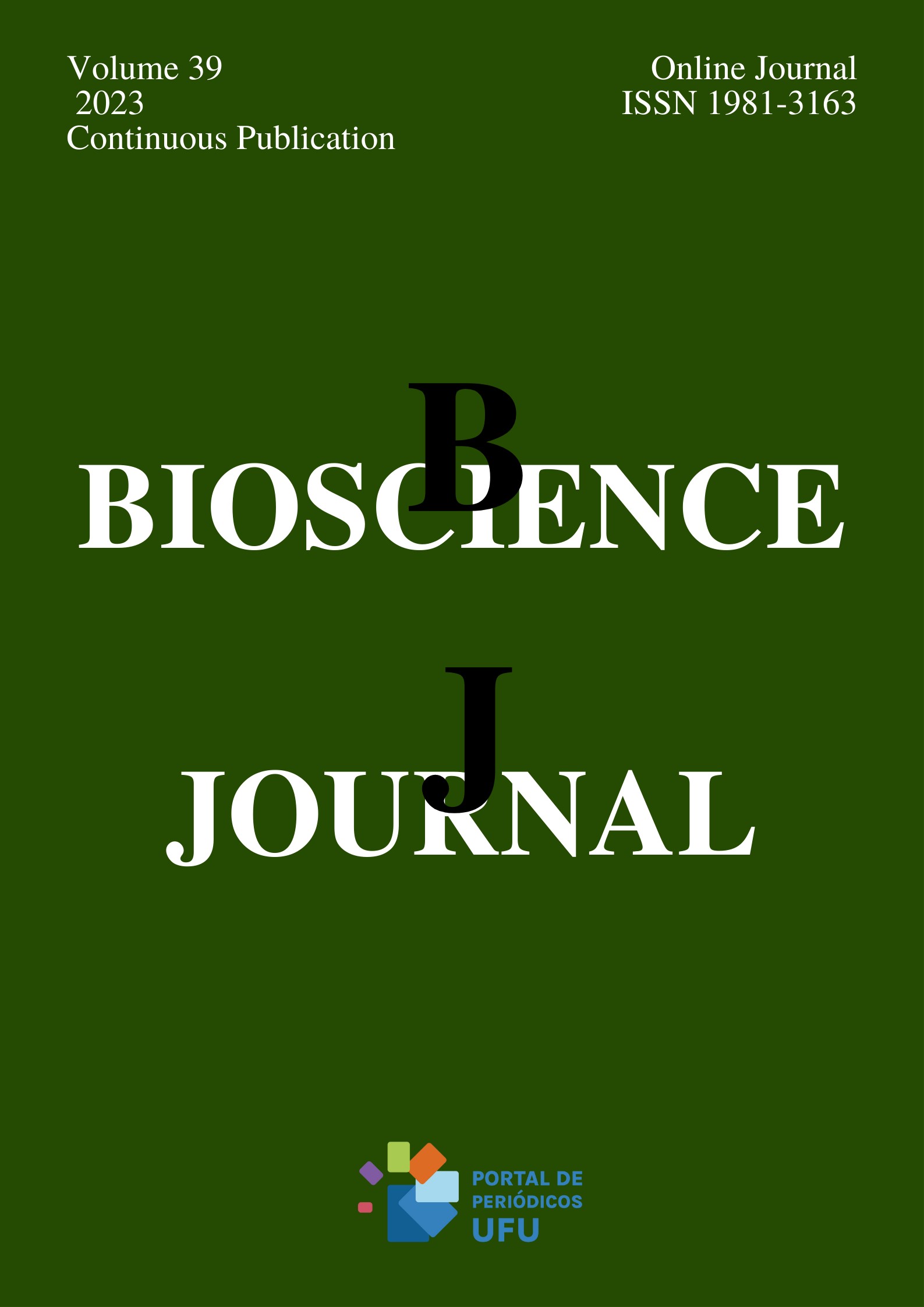Physiological quality of Capsicum chinense 'Adjuma' seeds during development
DOI:
https://doi.org/10.14393/BJ-v39n0a2023-64823Keywords:
Enzymes, Germination, Pepper, Seed maturation.Abstract
Once “bode” pepper plants (Capsicum) have continuous development and fructification, it is not possible to determine a specific season for seed physiologic maturation and harvest. This research aimed to evaluate physiological quality of “bode” pepper (Capsicum chinense 'Adjuma’) during fruit development and enzymes expression on seed germination. Manually extracted seeds were submitted to physiological tests being evaluated germination at first count (FC), final (G), and germination speed index (GSI), additionally, enzymatic analyses were carried. The lowest values for the physiological tests were observed for initial development stages. The greatest for FC, G and IVG were observed for seeds from fruits 70 days after anthesis (DAA). Superoxide dismutase enzyme has the highest values on seeds harvested at 49 DAA while malate dehydrogenase has more expression at 70 DAA. Catalase, alcohol dehydrogenase, and esterase have the higher expression at 63 DAA. The maturation stage influences bode pepper seed physiological quality, being seeds harvested at 70 DAA those with the better results on the evaluated parameters, thus, considered physiologically mature and the indicated time for harvest.
References
ALFENAS, A.C. Eletroforese e marcadores bioquímicos em plantas e microrganismos. 2. ed. Viçosa, UFV, 2006.
ALVES, A.S., et al. Influência dos diferentes estágios de maturação do fruto na germinação de sementes de pimenta de cheiro. Brazilian Journal of Animal and Environmental Research. 2020, 3, 1197-1201. https://doi.org/10.34188/bjaerv3n3-038
ANDRADE, D.B., et al. Morphological, physiological, and biochemical indicators of quality in tobacco fruits and seeds. Genetics and Molecular Research. 2018, 17, 1-16. https://doi.org/10.4238/gmr18058
ARAÚJO, R.F., et al. Alterações fisiológicas e atividade de enzimas antioxidantes em sementes de pimentas Capsicum chinense Jacq e Capsicum frutescens L. durante o processo de maturação. Revista Ceres. 2018, 65, 534-545. https://doi.org/10.1590/0034-737X201865060009
BAREKE, T. Biology of seed development and germination physiology. Advances in Plants & Agricutlure Research. 2018, 8, 336-46. https://doi.org/10.15406/apar.2018.08.00335
BRASIL. Ministério da Agricultura, Pecuária e Abastecimento. 2009. Regras para análise de sementes. Secretaria de Defesa da Agropecuária – MAPA/ACS.
CARVALHO, S.I.C., et al. Pimentas do gênero Capsicum no Brasil. Brasília: Embrapa Hortaliças-Documentos, 2006.
FIGUEIREDO, J.C., et al. Maturação de sementes de pimenta em função de épocas de colheita dos frutos. Scientia Agraria. 2017, 18, 1-7. http://dx.doi.org/10.5380/rsa.v18i3.51324
GONÇALVES, L.S., et al. Potencial fisiológico da semente de pimenta dedo-de-moça em relação aos estádios de maturação e períodos de descanso dos frutos. Horticultura Brasileira. 2018, 36, 486-491. https://doi.org/10.1590/S1806-66902014000400011
GONÇALVES, V.D., et al. Maturação fisiológica de sementes de pimenta 'Bode Vermelha'. Revista Caatinga. 2015, 28, 137-146. https://doi.org/10.1590/1983-21252015v28n316rc
JUSTINO, E.V., et al. Determinação da maturidade fisiológica de sementes de pimenta dedo de moça Capsicum baccatum var. pendulum. Horticultura Brasileira. 2015, 33, 324-33. https://doi.org/10.1590/S0102-053620150000300008
LI, R., et al. Enhancing iodine content and fruit quality of pepper (Capsicum annuum L.) through biofortification. Scientia Horticulturae. 2017, 214, 165-173. https://doi.org/10.1016/j.scienta.2016.11.030
QUEIROZ, L.A.F. and VON PINHO, E.V.R. Época de colheita e secagem na qualidade de sementes de pimenta Habanero Yellow. Revista Brasileira de Sementes. 2011, 33, 472-481. https://doi.org/10.1590/S0101-31222011000300010
RASBAND, W.S. Imagej, U.S. National Institutes of Health. Maryland, Bethesda, 2020. https://imagej.nih.gov/ij/docs/faqs.html
REBOUÇAS, T.N.H., VALVERDE, R.M.V. and TEXEIRA H.L. Bromatologia da pimenta malagueta in natura e processada em conserva. Horticultura Brasileira. 2013, 31, 163-165. https://doi.org/10.1590/S0102-05362013000100026
SALEH, B.K., OMER, A. and TEWELDEMEDHIN, B. Medicinal uses and health benefits of chili pepper (Capsicum spp.): a review. MOJ Food Process Technology. 2018, 6, 325-328. http://dx.doi.org/10.15406/mojfpt.2018.06.00183
Downloads
Published
Issue
Section
License
Copyright (c) 2023 Pedro Yuri Cavasin, Wilson Vicente Souza Pereira, Heloisa Oliveira dos Santos

This work is licensed under a Creative Commons Attribution 4.0 International License.





